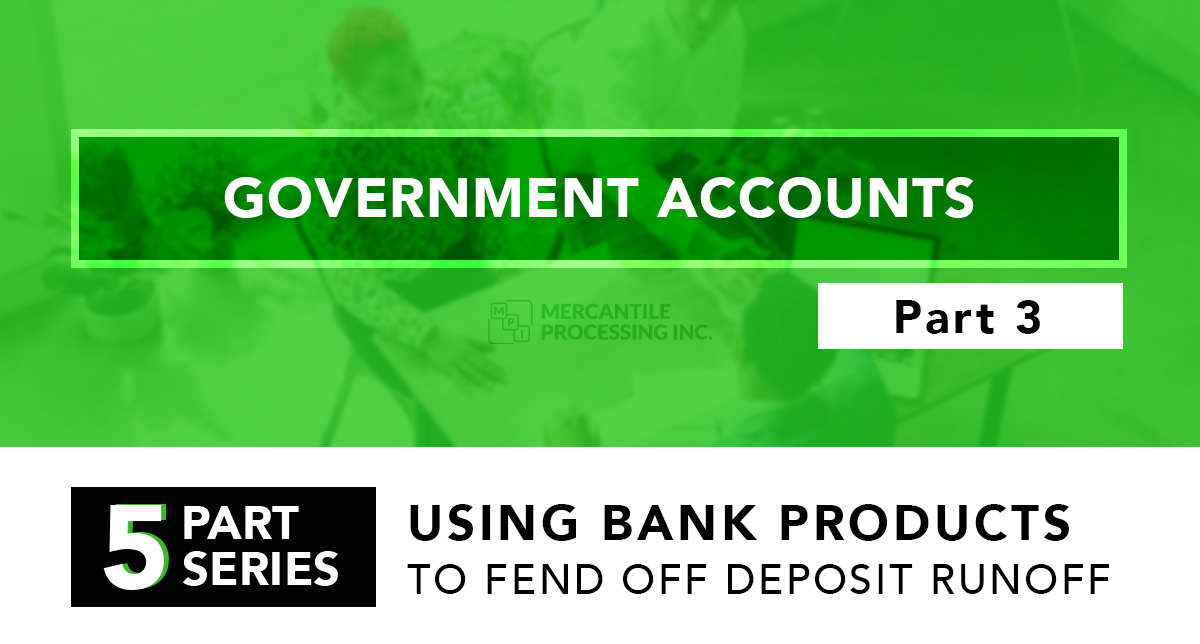
25 Aug Using Bank Products to Fend off Deposit Runoff: Part 3 of a 5-Part Series
Non interest bearing deposit accounts are the gold standard for most banks in the current market. Rapid fed rate increases have put many banks in a position where their current loans have not yet ballooned and were written when the fed rate was sub 1%. This means that if banks want to continue making a profitable net interest margin they need to continue to have as many deposits as possible in non interest bearing accounts. The problem is that many banks are now capturing deposit accounts by offering 4%+ on savings accounts so some of those sedentary accounts are being moved out of the bank to accounts where they can make money. The key to stopping this runoff is to keep those funds in motion. If the merchant uses their account to run their business they are less likely to move them off the balance sheet. Making deposits sticky and/or adding new accounts has never been more important and in this five-part series, we will expose five simple products and targets to help your bank add or retain deposit volume.
Part 3: Government Accounts: Utility Payments, Reserve Accounts, Tax Payments
Government entities cover many potential Non Interest bearing accounts. Clients can be Townships, cities, counties, courts, parks/rec, and regional state agencies. For these entities deposit accounts can be utility payments, tax payments, fees, fines, tickets, parking, memberships, and many more. We will talk about a few of these accounts and what can attract them to your bank from a payments and technology standpoint.
Utility accounts are important for a town or county and are often the most active. These are water, sewer, electric, and trash. Some towns bill monthly or quarterly. They often use third-party billing software to track usage and then consolidate that information into their town’s accounting software. A Community Bank can make the most impact in this area by reducing accounts receivable. The ability for towns to collect payment on their website or through inbound phone calls via credit card or ACH drastically reduces a town’s outstanding past-due balances. People are creatures of comfort and convenience and we find they are more likely to pay the bills that are easiest to pay first. This means if they can go directly to the town’s website and enter a form of payment at any time they are likely to complete that payment. If they have to write a check, find an envelope, and pay for a stamp they are less likely to pay that bill in a timely manner. Towns can cover the cost of these payments by passing the cost of credit card processing on to the payer. Most towns charge a flat dollar amount per transaction. The second most effective way to help government entities with utility billing is to integrate it into their accounting system and enable recurring payments. Recurring payments reduce friction even further since the balance is paid automatically and the citizen knows it gets deducted from their account every time. This leads to a more dependable cash flow in the town’s account.
Tax payment accounts historically have massive ebbs and flows for bank balances, but they are often the largest accounts besides the reserve account that a government entity has. Taxes include property tax, income tax, use tax, and often other regional taxes. In most states towns and counties have to run off zero budget bases which means they can only spend a portion of their estimated taxes. If the collection of those taxes becomes past due they have to adjust that basis down and/or the collection of past due goes up in order to have more money to spend. The value your bank can offer by helping them collect more revenue in a timely manner is a consistent budget and better town cash flow. Traditionally these will be large deposit accounts around the time taxes are due and will slowly run off. They are still great non interest bearing accounts.
Many towns have police on staff and have paid parking, application fees, and other permitting costs. These fees and fines are also great opportunities to advance the payment experience for a municipality or township. Paying a parking ticket or permit request should be an online and easy process. Many entities still require in-person or mailed processes. This is more work for the constituents and the staff. Helping them improve the payment process helps their cash flow and they can deploy employees to other tasks. These accounts are more year-round than deposit accounts and are more stable.
While this article is focused on attracting through technology your institution can also attract through offering sweep accounts, increasing FDIC coverage so they don’t have to spread their reserves, offer remote deposits, and even lock boxes. These deposit accounts often end up at the larger banks due to their complications, but most would prefer at least some of their business to be in the town with a community bank that supports the citizens they represent.
